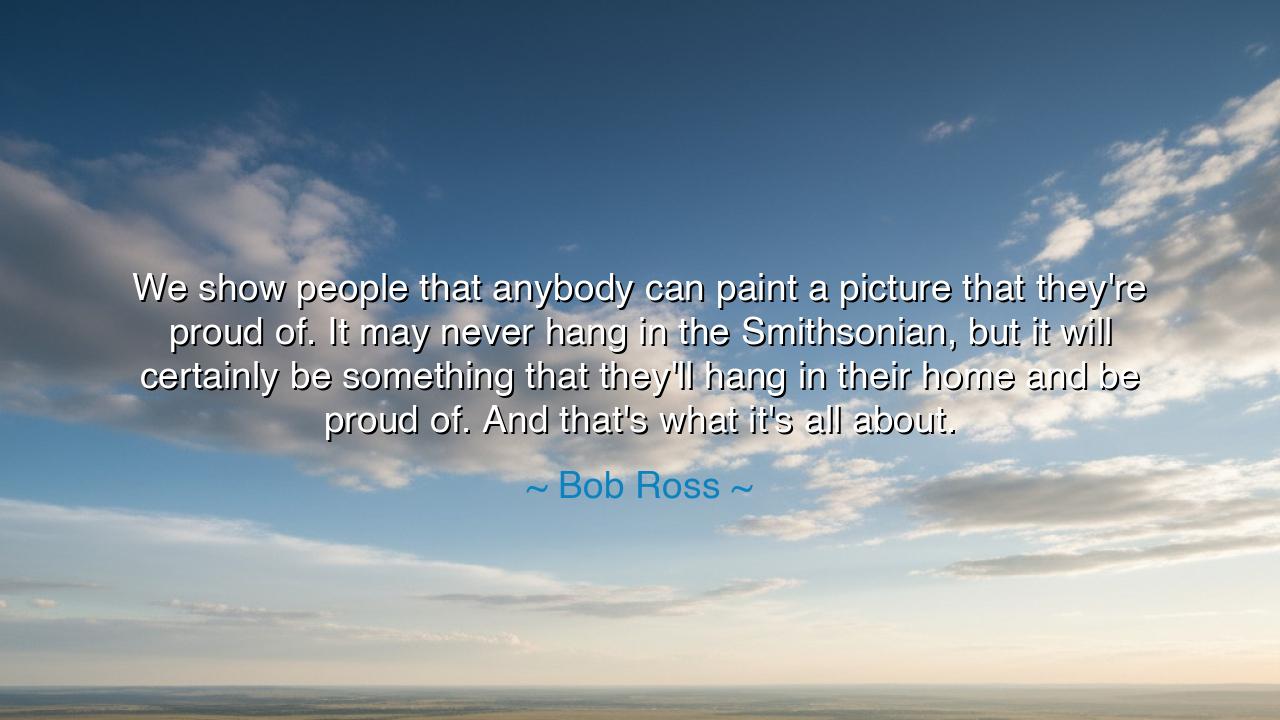
We show people that anybody can paint a picture that they're
We show people that anybody can paint a picture that they're proud of. It may never hang in the Smithsonian, but it will certainly be something that they'll hang in their home and be proud of. And that's what it's all about.






In the gentle yet timeless words of Bob Ross, the painter of peace and poet of color, we find a philosophy as luminous as his landscapes: “We show people that anybody can paint a picture that they're proud of. It may never hang in the Smithsonian, but it will certainly be something that they'll hang in their home and be proud of. And that's what it's all about.” These words are not merely about art; they are about the dignity of creation, the quiet triumph of effort, and the sacred joy of self-expression. Ross speaks as the ancients once did—of simplicity, humility, and the divine spark that resides in every human hand.
In an age when greatness is measured by fame and validation, Ross reminded us of a higher truth: that beauty is not for the elite, nor is creativity the birthright of a chosen few. His canvas was a mirror for all hearts. He believed that within every person dwells an artist waiting to be awakened—not through talent alone, but through patience, courage, and love. His words echo the wisdom of the old craftsmen and philosophers who knew that art’s true power lies not in its perfection, but in its ability to heal the soul.
Consider the spirit of Bob Ross’s world—a realm where there are “no mistakes, only happy accidents.” To him, the brush was not an instrument of mastery, but of freedom. The mountain, the tree, the stroke of blue sky—they were not symbols of art’s grandeur, but invitations to rediscover wonder. His quote reminds us that creation is an act of faith, not judgment. It is a return to innocence, a quiet rebellion against the tyranny of self-doubt. Whether one’s work hangs in the Smithsonian or simply upon a humble wall at home, what matters is the joy that flows from the act of making.
There is a story told of the ancient potter’s village in Japan, where master artisans taught their students not to chase flawlessness, but to embrace imperfection. One day, a young apprentice wept because his bowl cracked in the kiln. The master smiled and filled the fracture with gold, saying, “Now your flaw makes it eternal.” This art, known as kintsugi, lives in the same spirit as Bob Ross’s teaching—it tells us that creation’s worth is not in acclaim, but in the love that repairs and redeems. To make something imperfectly, and to cherish it, is to honor life itself.
When Ross says the painting “may never hang in the Smithsonian,” he speaks not in sorrow but in liberation. For to create only for recognition is to live in chains. The true artist is not he who seeks applause, but he who listens to the whisper of his own heart and answers it with color, song, or word. The painting that hangs in a home, seen daily by the eyes that made it, is far greater in intimacy and power than one admired by strangers. It is a symbol of self-belief, of the courage to begin, and of the quiet pride that grows when one creates for love’s sake alone.
This teaching stretches far beyond the easel. It belongs to every act of creation—to the gardener who tends her flowers, to the cook who stirs a pot with care, to the parent who builds something beautiful from the chaos of each day. The world tells us that greatness is measured by public triumph, but the wise know that the truest victories are private—the moments of quiet pride when one can say, “This is mine, and I made it with my own hands.”
So, dear listener, remember this: you are an artist, no matter your craft. Let go of the fear of judgment. Create, not for the world’s applause, but for your own peace. Hang your work proudly, not in museums, but in your heart. And when doubt whispers that your effort is small, remember that even the grandest temple begins with a single carved stone, and even the greatest painter once trembled before a blank canvas.
Thus, let Bob Ross’s gentle wisdom guide you: create with love, not ambition; with courage, not comparison. For the measure of your art is not its fame, but the joy it brings to you and to those who share your home, your heart, and your vision. In every “happy little tree” and every imperfect brushstroke lies the divine truth of creation—that to make something, to love it, and to be proud of it, is the closest we come to touching eternity.






AAdministratorAdministrator
Welcome, honored guests. Please leave a comment, we will respond soon